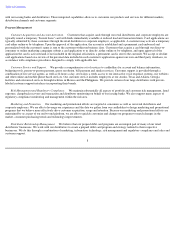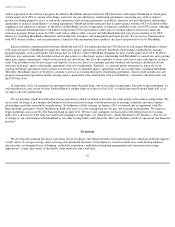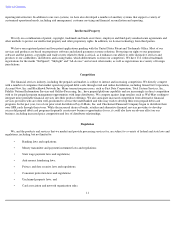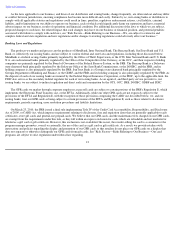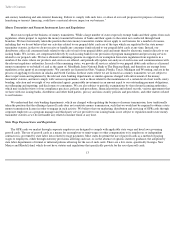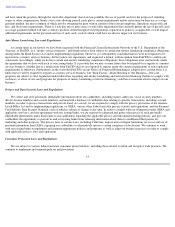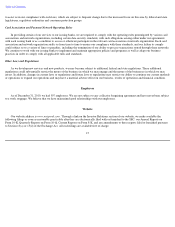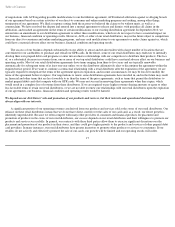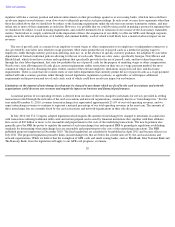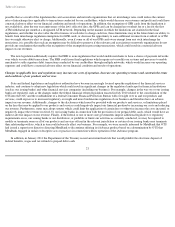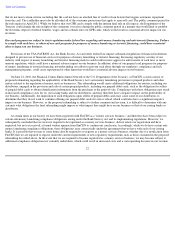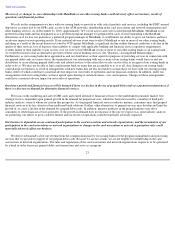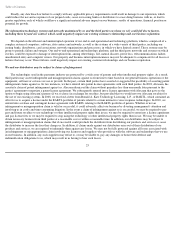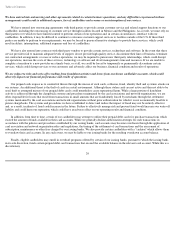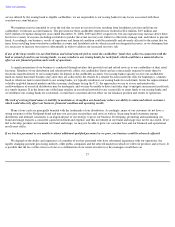NetSpend 2010 Annual Report Download - page 22
Download and view the complete annual report
Please find page 22 of the 2010 NetSpend annual report below. You can navigate through the pages in the report by either clicking on the pages listed below, or by using the keyword search tool below to find specific information within the annual report.
Table of Contents
We are subject to extensive and complex federal and state regulation and new regulations and/or changes to existing regulations could
adversely affect our business.
As an agent of, and third-party service provider to, our issuing banks, we are subject to indirect regulation and direct audit and
examination by the Office of Thrift Supervision, or the OTS, the Office of the Comptroller of the Currency, or the OCC, the Board of
Governors of the Federal Reserve System, or the FRB, the Georgia Department of Banking and Finance, or the GDBF, and the Federal Deposit
Insurance Corporation, or the FDIC. We are also subject to direct regulation by those states in which we are licensed as a money transmitter.
We have historically taken the position that state money transmitter statutes do not apply to our business for a number of reasons. We
discuss this in greater detail under "Business—Regulation—Money Transmitter and Payment Instrument Laws and Regulations." In the event
that a state regulatory authority were to disagree with our position that we are not required to be licensed in any of the states in which we are
not currently licensed, it is possible that we, our distributors or our issuing banks could become subject to regulatory enforcement or other
proceedings, which could in turn have a significant adverse impact on our business, even if we were to ultimately prevail in such proceedings.
In such event, we may have additional arguments available to us that we should not be subject to the licensing requirements under the relevant
state money transmitter statutes, and may utilize one or more of these arguments at such time. However, it is possible that we could be
unsuccessful in making a persuasive argument that we should not be subject to such licensing requirements, and could be deemed to be in
violation of one or more of the state money transmitter statutes. Such failure to comply could result in the imposition of fines, the suspension of
our ability to offer some or all of our prepaid debit cards in the relevant jurisdiction, civil liability and criminal liability, each of which would
likely have material adverse impact on our revenues.
On March 23, 2010, the FRB issued a final rule implementing Title IV of the Credit Card Accountability, Responsibility, and Disclosure
Act of 2009, or CARD Act, which imposes requirements relating to disclosures, fees and expiration dates that are generally applicable to gift
certificates, store gift cards and general-
use prepaid cards. We believe that our GPR cards, and the maintenance fees charged on our GPR cards,
are exempt from the requirements under this rule, as they fall within an express exclusion for cards which are reloadable and not marketed or
labeled as a gift card or gift certificate. However, this exclusion is not available if the issuer, the retailer selling the card to a consumer or the
program manager promotes, even if occasionally, the use of the card as a gift card or gift certificate. As a result, we provide retailers with
instructions and policies regarding the display and promotion of our GPR cards. It is possible, however, that despite our instructions and
policies to the contrary, a retailer engaged in offering our GPR cards to consumers could take an action with respect to one or more of the cards
that would cause each similar card to be viewed as being marketed or labeled as a gift card, such as by placing our GPR cards on a display
which prominently features the availability of gift cards and does not separate or otherwise distinguish our GPR cards from the gift cards. In
such event, it is possible that such GPR cards would lose their eligibility for such exclusion to the CARD Act and the rule's requirements, and
therefore could be deemed to be in violation of the CARD Act and the rule, which could result in the imposition of fines, the suspension of our
ability to offer our GPR cards, civil liability, criminal liability, and the inability of our issuing banks to apply certain fees to our GPR cards,
each of which would likely have a material adverse impact on our revenues.
As the laws applicable to our business, and those of our distributors and issuing banks, change frequently, are often unclear and may differ
or conflict between jurisdictions, ensuring compliance has become more difficult and costly. Any failure, or perceived failure, by us, our
issuing banks or our distributors to comply with all applicable statutes and regulations could result in fines, penalties, regulatory enforcement
actions, civil liability, criminal liability, and/or limitations on our ability to
18


